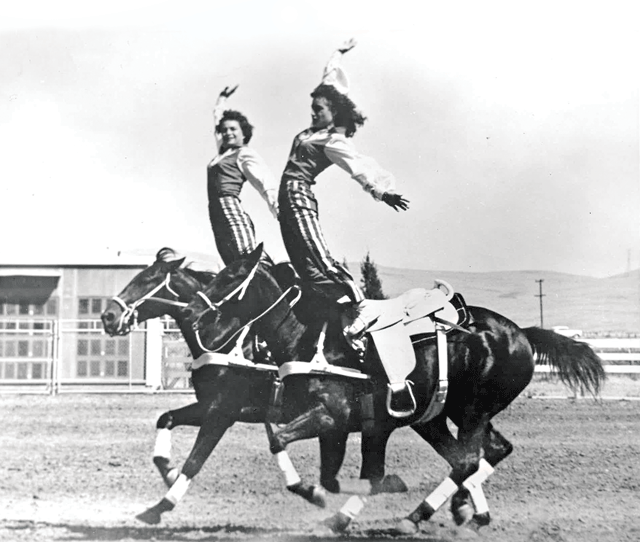The Ludwig Twins – Wilma and Wanda – made their mark, and their living, in the horse and rodeo world.
Wilma Ludwig Hybarger and Wanda Ludwig Cagliari were born in Auburn, California in 1935, the daughters of Everett and Edith Ludwig. They were raised on a dairy farm, bottling and delivering the milk the hired man and their dad milked, and when the hired man was on vacation, the girls helped in the milk barn. Hard work was part of their upbringing, but it was a good life.
Their first horse was a Shetland named Nipper. Then came a big paint horse called Chief. Their dad would buy horses from the Roseville, Calif. auction ring and bring them home for the girls, and that’s how they learned to ride.
It was when they were in their teens that they saw trick riding for the first time. They were at a rodeo in Hughes Stadium in Sacramento, Calif., with Buddy Farren trick riding. “We decided that’s what we wanted to do,” Wilma said. Their parents didn’t approve. But when Everett and Edith took a two week trip to New York, the girls stayed home to do chores, driving to Buddy’s place in Sacramento, to take trick riding lessons.
By the time their parents were home, Wilma and Wanda were accomplished enough that their parents consented to the two to continue. They learned more, and then a stock contractor, Ray Hicks, wanted to hire them. They worked for him, then took other contracts for other rodeos, gradually working events across the western U.S.
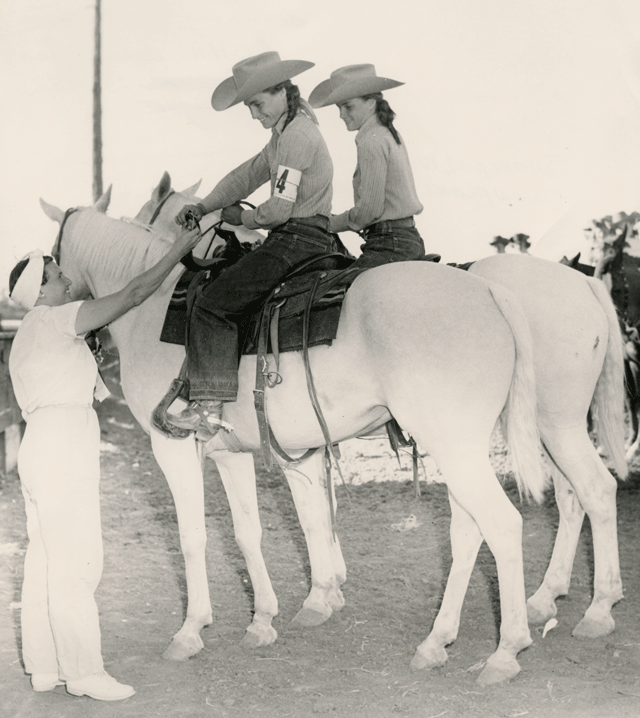
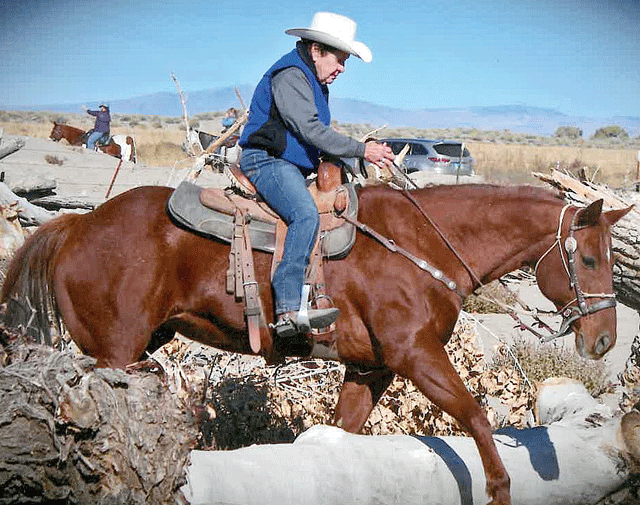
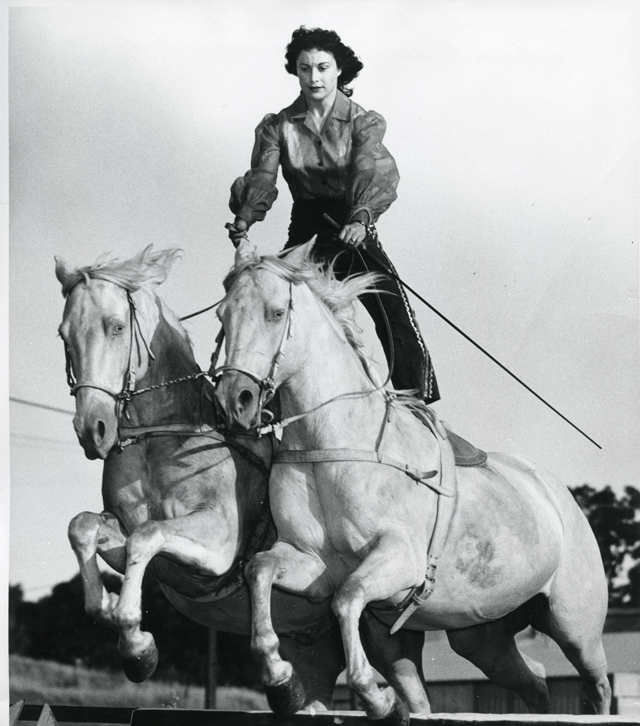
For fifteen years, from the time they were eighteen to the early 1970s, the women entertained fans with their dazzling trick riding. And it wasn’t just rodeos that hired them. Any event that wanted entertainment would book them.
In 1972, the duo decided to quit trick riding. By this time, they had moved to Nevada, were both married, with small children, and it was time to do something else.
For both women, the “something else” still involved horses.
They had trained horses in their trick riding days, but now they did even more of it. They didn’t work together, but each trained horses for a wide variety of disciplines. Both women had horses that excelled at the National High School Finals Rodeo, the College Finals Rodeo, and the National Finals Rodeo. Wanda’s daughter won the barrel racing at the College Finals in 1988 on a horse Wanda trained. Both had shown horses in their teens, and Wilma continued to show, becoming the first woman to make the finals in the snaffle bit futurity in Reno, Nev. Wilma also had barrel horses that qualified for the Indian National Finals Rodeo.
Wilma gave lessons (and continues to) to beginning and advanced riders, barrel racers, cutters, anyone who wanted to get better on a horse. She’s tutored riders who have been successful in every discipline. Wilma never competed professionally, but in 1991, she won the Reno Rodeo aboard Wanda’s barrel horse Toppy, when the rodeo was not a WPRA event that year.
After the trick riding, Wanda began running barrels. She stayed in the state associations: the Nevada Cowboys Association, the California Cowboys Association, the Idaho Cowboys Association, and the Nevada Barrel Racing Association for ten years, winning the NCA nine consecutive years, the CCA twice, and the Nevada Barrel Racing title ten consecutive years. She ran into Tom Marvel, the father of 1978 world champion saddle bronc rider Joe Marvel, at a sale. He told her she should go pro. “You have a good horse,” he told her, “and you might not get another one like it.”
So she did. It was 1980, and she was a barrel racer in the Women’s Pro Rodeo Association for eleven years. She stayed close to home when she could, but rodeoed across the nation, qualifying for the National Finals Rodeo in 1980 and 1981 and winning Rookie of the Year in 1980.
The horse Wanda rode at pro rodeos was Whats the Use, “Whatsit.” The three-year-old mare was fourteen hands tall, and “looked like a pig,” Wanda remembered. The seller told her Wanda could have her, and if she was able to make something out of her, he’d take $350 for her. Wanda didn’t want her, but the mare from the Jack Schawbacker ranch in Madera, California, was already loaded in the trailer.
So Wanda trained her. Whatsit was talented at everything: running barrels, heading, heeling, poles, cattle work, “she did anything you asked her to do,” Wanda said. “She was a good horse, just a natural.”
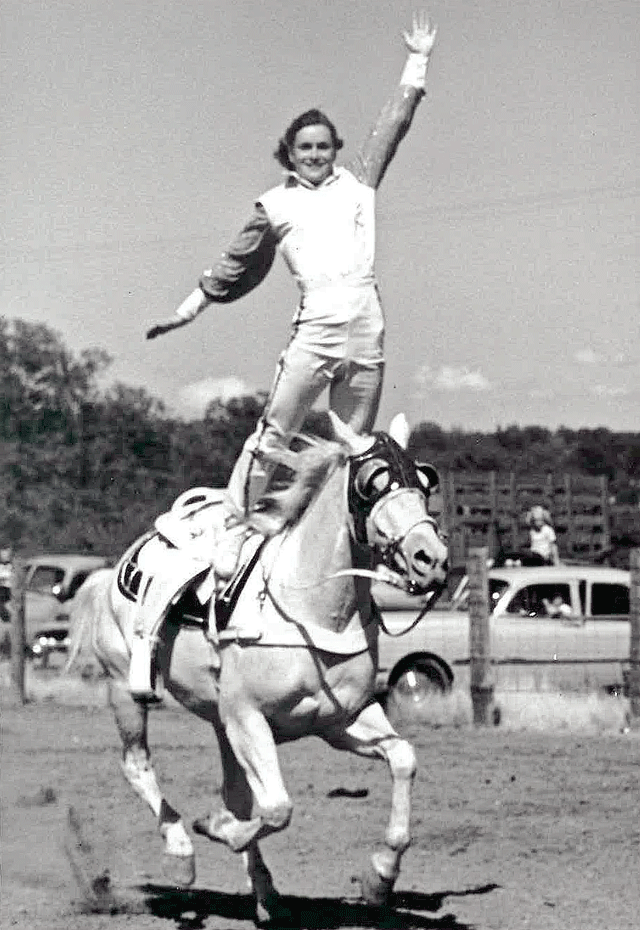
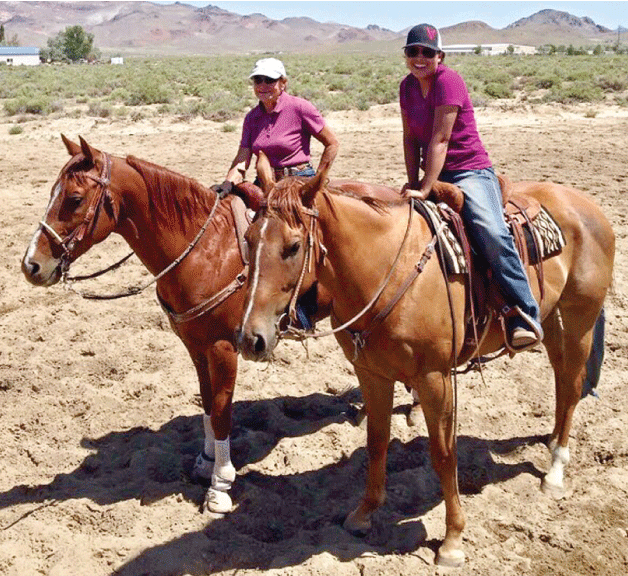
After nearly a dozen years of WPRA rodeo, Wanda called it quits. She had competed at fifty or sixty rodeos each year, and “it was quite a chore,” she said. “You drove till your head almost fell off.”
The next stage of the twins’ rodeo competition began.
Wilma and Wanda joined the National Senior Pro Rodeo Association in the 1990s. Wilma mostly barrel raced and occasionally team roped and ribbon roped. Wanda ran barrels, team roped, ribbon roped, and did a little breakaway, too. Wanda won the senior pro barrel racing title ten consecutive years, the all-around title eight out of ten years and the reserve title twice. She was also the 1993 Canadian Senior Pro Rodeo champion barrel racer.
At a rodeo in Wells, Nevada, a cowboy approached Wanda. “He said, “we gotta do something about you. You’re winning too damn much.” Wanda “got mad and told him off,” she said. “I’ve worked too hard my whole life and I don’t need you telling me I have to quit.” Unofficially, Wanda was the first woman to win the all-around title against men in the senior pro association. After that, the competition was split into two divisions: the men and the women.
Wilma has a knack for re-training horses that came to her with problems. She remembers a barrel horse once, where, at the first barrel, he’d run down the fence. The rider brought him to Wilma, asking if she could fix him, and how long it would take. Wilma replied, “It’ll take me as long to fix it as it took you to mess him up.” It took a year and a half to straighten the horse out. The rider was “ripping on his head, and that’s why he ran off,” Wilma said. “He’d say, I’ve had enough of this and he’d go down the fence.”
The rider couldn’t wait while her horse was being “fixed”, so she sold him to Wilma, who called him Belairo. Wilma rode him in the senior pros and won the senior reserve world champion barrel racing and the Canadian Senior Horse of the Year on him.
Oftentimes, Wilma says people think of horses as machines. “They are not,” she said. “They are an animal with a brain, and a good brain.” It takes time to train horses. “There’s nothing better than time. Slow and easy to start, so they don’t get scared of anything. If you scare them, it’s hard to get them back.”
Two of Wilma’s protégés: Hayley Campbell and Randi Buchanan, are known as “Wilma’s girls.” Both women are barrel racers and have had success. Buchanan said Wilma “is one of those people who teaches you to get out of your horse’s face and work with your legs. That was something I admired. She gave me the mechanics to do that.”
Now in their eighties, the ladies live about a mile from each other and haven’t slowed down. Wanda retired from barrel racing in 2012, due to a bad back, and Wilma still trains horses. Wanda is involved in the trail trials, rides with obstacles similar to the trail riding competition at horse shows but in a larger outdoor setting.
Both women set the next generation on horseback. Wilma’s son, Russ Ferretto, and daughter, Cindy Ferretto, were competing by the time they were four years old. Wanda’s daughter, Cathy Cagliari, lives in Corning, Calif. and has won the California Cowboys Rodeo Association barrel racing and breakaway roping titles several times.
The women are both inductees into the Nevada Horseman’s Association Hall of Fame, and Wanda is a member of the Senior Pro Rodeo Hall of Fame and the University of Nevada Sanford Stars Hall of Fame.
Their lives were, and still are, satisfying, they say. “I wouldn’t trade my life for anything. It was fun, and I made money at it,” Wanda said. They were able to make a living doing something they loved.








